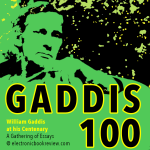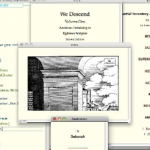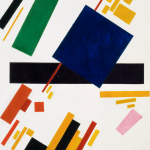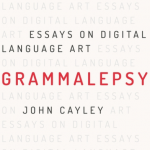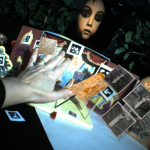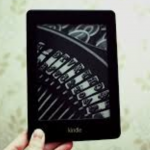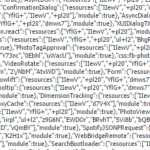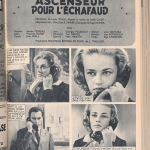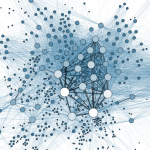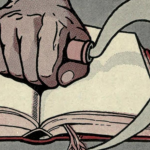2024
Further memories from yet another student of William Gaddis during the time when WG taught at Bard.
2023
Accepting Søren Bro Pold's proclamation that "the social knowledge base of the University has already disappeared", Davin Heckman locates a few, forward looking prospects for a reconstruction of the Humanities in Jean-François Lyotard's "famously sloppy" Postmodern Condition (1971), Hannah Arendt's Human Condition(1958), and Imanuel Kant's prescient hope that the University could serve as a "mediating nexus among a growing array of conflicting professional tendencies."
In this anticipation of John Cayley's ebr essay on Artificial Intelligence, Scott Rettberg contextualizes some of the ethical and systemic problems of ChatGPT and argues that works of electronic literature and digital art might serve as tutor texts for understanding effects of technological mediation on humanity.
In his response to John Cayley, Dougherty takes the current concern with AIwriting as an opportunity to revive one of ebr's long-running threads; namely: the critical, contrarian riPOSTe.
Pold extends Heckman's "thrilling (if not chilling)" critique to left-wing understandings and critical takes by theorists such as Walter Ong, Bernard Stiegler, and Vannevar Bush.
2021
In “Better with the Purpose In: or, the Focus of Writing to Reach All of Your Audience,” Deena Larsen responds in a riPOSTe to Hannah Ackerman’s essay on sound elements in electronic literature, “Better with the Sound On” (ebr October 2021). Larsen approaches Ackerman’s essay from the position of a “dual writer” in exposition and exploration, exploring the question of audience in e-lit, particularly the imagined audience as one that is able-bodied and who may have specific embodied experiences of literature. In order to explore “multiple audiences with the same message,” including by tapping into multiple senses, Larsen draws upon Kate Pullinger’s work Letter to an Unknown Soldier and Amira Hanafi’s A Dictionary of the Revolution.
In this riPOSTe-turned-essay, John Cayley reflects on “the perpetual problem of terminology” in the field of electronic literature.
2020
Berens asks: Should the e-literature community include third-generation works in collections, syllabi, databases, prizes? A related question: do third-gen makers have a role in “decolonizing” e-literature? Who or what “colonizes” e-lit? E-literature, like earlier avant gardes, began as a coterie and has become a scholarly field. Using the comparison of a field versus a walled garden, the essay examines critiques of e-literature and variations on field definitions. It ends with two ideas about how to "decolonize" e-literature; about how equity and inclusion work in tandem with decolonization, but are not the same thing; and why decolonization efforts are urgent in the context of pandemic and protests supporting Black lives and racial justice.
A critique of Third Generation, web based electronic literature from a first generation maker and author of "The Moving Word" (2000), Janez Strehovic. Image from Olia Lialina's Ann Karenin Goes to Paradise
2019
2018
Dani Spinosa, who edited and introduced the Dubai gathering, endorses Hayles' position on the collaborative, cognitive, and (not least) communal potential of human-computer co-authorship.
From an author celebrated for a career devoted to the digital, Cayley's book offers a cogent demonstration that "verbal language has been ideologically fettered to the medium of print for far too long." Ensslin, in her riposte, notes how Cayley's venture into a pre-digital format resonates with numerous recent works (in print and online; creative and critical), offering a "much-needed pathway out of institutionalized literary systems and practices.
Aquilna reflects on the reflections in Callus and da Silva's "Strange Metapaper."
Indirectly responding to Callus's and Aquilina's essay, Anna Nacher finds a 14th way of describing e-literature: employing the Deleuzean concept of a “minor“ style.
Agreeing that translation studies does well to address questions of transcoding, Nick Montfort further extends the project advocated by Maria Mencia, Soeren Pold, Manuel Portela (and our first respondent, Belgian Poet Laueate Jan Baetans). A look at explorations of the topic in early e-lit turns up longstanding interests in the translinguistic, transcreational, the metrical, material, and contextual. Montfort offers this itemization not just to enlarge a specific list and topology for translation studies, but to show that the concept of literary translation almost certainly needs to be exploded and reworked.
In response to Mencia, Pold, and Portela, Belgian poet and scholar Jan Baetans suggests that we might view the field of trans-medial literature as an offshoot of translation studies (and not the reverse). In any case, whether we approach e-lit from a medial or linguistic standpoint, scholars do well to observe a "merger of translation and adaptation studies."
In response to Baetans's essay, David Roh sees an occasion for moving digital literary studies beyond the archive toward a a living repository of anarchistic, ongoing communitarian activity with a "resurgent cultural impact."
A post-humanist critique of Rockwell and Berendt's all too Humanist essay, in the vein of Donna Haraway’s “Keeping with the Trouble: Making Kin in the Cthulucene” (2016) and Patricia MacCormack’s “Posthuman Ethics” (2012).
Max Nestelieiev responds to Joseph McElroy’s recent ebr essay, exploring how Soviet control enforced onto writers a self-censorship for which their work paid the price.
A dedicated, elaborated thought stream from an author who, like McElroy, has read and thought about the presence of censorship (as theme and experience) in novels by Ross Gibson, Shariar Mandinipour,J. .M. Coetzee, W. G. Sebald, Mark Z Danielewski, Italo Calvino, and Fernando Pessoa. Author David Thomas Henry Wright explores the (loss of) authority of the literary novel in a time of "networked glut" while at the same time seeking trans-national, trans-historical, photographic, multi-medial and inter-generational "alliances" that might redress contemporary censorship and "deeply shape (or erode) contemporary literature."
